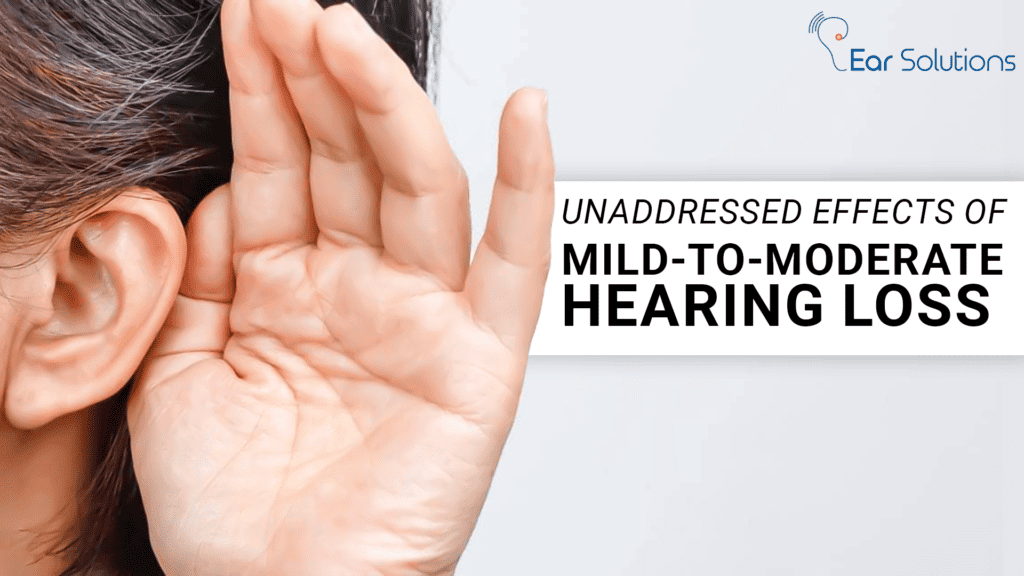Introduction
Hearing loss is a common condition affecting millions of individuals worldwide. This article explores the often overlooked consequences of mild-to-moderate hearing loss. It delves into its impact on emotional well-being, professional life, cognitive health, and overall quality of life.
Understanding Mild-to-Moderate Hearing Loss
What is Mild-to-Moderate Hearing Loss?
Mild-to-moderate hearing loss encompasses difficulties in hearing soft sounds and understanding speech in noisy environments. It’s essential to understand the severity of the impairment for effective intervention.
Causes and Risk Factors
Various factors, including aging, exposure to loud noises, genetics, and medical conditions, can contribute to hearing loss. Identifying the root cause is crucial for appropriate management.
The Importance of Timely Diagnosis
Early diagnosis is key to managing hearing loss effectively and preventing further deterioration.
The Emotional Toll of Hearing Loss
Isolation and Loneliness
Individuals with untreated hearing loss often withdraw from social interactions due to communication difficulties, leading to feelings of isolation and loneliness.
Increased Stress and Anxiety
Struggling to hear and communicate can result in heightened stress and anxiety, impacting overall well-being.
Relationship Strain
Hearing loss can strain relationships due to misunderstandings and miscommunications. Addressing hearing loss can improve interpersonal connections.
Impacts on Professional Life
Career Limitations
Untreated hearing loss can limit job opportunities and hinder career growth, affecting financial stability.
Workplace Challenges
Challenges such as meetings and phone calls can become obstacles. Accommodations can mitigate these difficulties.
Stigmatization and discrimination in the workplace can further hinder career advancement for those with hearing loss.
Cognitive Effects
Cognitive Decline
Research indicates a connection between untreated hearing loss and cognitive decline. Managing hearing loss is vital for brain health.
Increased Risk of Dementia
Untreated hearing loss is associated with a higher risk of dementia. Cognitive stimulation can help reduce this risk.
Cognitive Strategies for Hearing Loss
Learning strategies to improve cognitive function while living with hearing loss is essential.
Quality of Life
Reduced Enjoyment of Hobbies
Hobbies and activities that once brought joy may become less enjoyable due to hearing limitations.
Hindrance in Social Activities
Engaging in social activities becomes challenging, leading to decreased participation and enjoyment.
Maintaining Independence
Independence can be compromised as simple tasks become more challenging without proper hearing.
Unaddressed Effects on Mental Health
Depression and Hearing Loss
Depression is more prevalent among those with hearing loss. Recognizing the signs and seeking help is vital.
Coping with Mental Health Challenges
Coping strategies can help individuals manage the emotional impact of hearing loss.
The Importance of Early Intervention
Seeking Professional Help
Professional audiologists can assess and provide guidance on managing hearing loss effectively.
Hearing Aids and Their Benefits
Hearing aids are powerful tools for managing hearing loss, improving communication, and overall quality of life.
Communication Strategies
Effective communication strategies can help individuals with hearing loss navigate social situations with confidence.
Understanding the Impact on Loved Ones
Family and Friends
Hearing loss doesn’t affect just the individual; it also impacts loved ones. Understanding their perspective is crucial.
Caregiver Challenges
Caregivers of individuals with hearing loss face unique challenges and responsibilities.
Building a Supportive Environment
Creating a supportive and understanding environment can make a significant difference in the lives of those with hearing loss.
Understanding the Impact on Loved Ones
Healthcare Costs
Untreated hearing loss can lead to increased healthcare costs due to related health issues.
Lost Income
Career limitations can result in lost income for individuals with hearing loss.
Insurance Considerations
Understanding insurance coverage and seeking potential benefits is essential for managing hearing loss costs.
Educational Challenges
Impact on Learning
Children and students with hearing loss may face educational challenges. Early intervention and support are critical.
Support in Educational Settings
Educational institutions must provide support and accommodations to help students with hearing loss succeed.
Technological Advancements
Assistive Listening Devices
Advancements in technology have led to a range of assistive listening devices that can greatly improve the lives of those with hearing loss.
Smartphone Apps and Connectivity
Smartphone apps and connectivity options make it easier for individuals with hearing loss to stay connected and communicate effectively.
Telehealth Services
Telehealth services have made it more convenient for individuals to access hearing healthcare.
Living with Unaddressed Hearing Loss
Coping Strategies
Learning to cope with hearing loss is essential for maintaining a positive outlook on life.
Hearing Loss Support Groups
Joining support groups can provide a sense of community and shared experiences.
Frequently Asked Questions (FAQs)
Q1: What is the difference between mild and moderate hearing loss?
Mild hearing loss makes soft sounds and whispers harder to hear, while moderate hearing loss challenges understanding speech even in quiet settings. The key difference is the degree of impairment, with moderate being more severe.
Q2: Can mild-to-moderate hearing loss worsen over time?
Yes, it can deteriorate if left untreated. Seeking help early, like using hearing aids, can prevent further decline and enhance overall life quality.
Q3: How can I help a loved one who is experiencing hearing loss?
Support them by encouraging professional help, practicing patience, using effective communication strategies, and considering assistive technologies when needed.
Q4: Are there natural remedies to improve hearing?
While no guaranteed remedies exist, a healthy lifestyle, noise protection, and regular check-ups can promote good hearing. Consult a healthcare professional for diagnosis and treatment options if hearing loss is a concern.
Q5: What are the latest advancements in hearing aid technology?
Modern hearing aids are smaller, provide better sound quality, offer connectivity to devices, use rechargeable batteries, and employ AI for personalized experiences.
Q6: Can hearing loss be prevented?
Not entirely, but you can protect your hearing by avoiding loud noises, maintaining ear hygiene, having regular check-ups, and leading a healthy lifestyle. Early intervention is essential for effective management.
Conclusion
Addressing mild-to-moderate hearing loss is not just about improving hearing; it’s about enhancing the quality of life. Recognizing the unaddressed effects and taking proactive steps, such as seeking professional help and embracing technological advancements, can lead to a brighter future for individuals with hearing loss.





